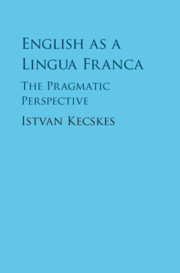Book contents
- English as a Lingua Franca
- English as a Lingua Franca
- Copyright page
- Contents
- Figures
- Tables
- Acknowledgments
- Introduction
- 1 The Nature of English as a Lingua Franca
- 2 Linguistic Creativity in ELF
- 3 Interactional Competence
- 4 Sociocultural Background Knowledge
- 5 Speaker’s Intention
- 6 The Semantics–Pragmatics Interface
- 7 Implicatures
- 8 Modality
- 9 Dialogic Sequences and Odd Structures
- Epilogue
- References
- Index
7 - Implicatures
Published online by Cambridge University Press: 18 November 2019
- English as a Lingua Franca
- English as a Lingua Franca
- Copyright page
- Contents
- Figures
- Tables
- Acknowledgments
- Introduction
- 1 The Nature of English as a Lingua Franca
- 2 Linguistic Creativity in ELF
- 3 Interactional Competence
- 4 Sociocultural Background Knowledge
- 5 Speaker’s Intention
- 6 The Semantics–Pragmatics Interface
- 7 Implicatures
- 8 Modality
- 9 Dialogic Sequences and Odd Structures
- Epilogue
- References
- Index
Summary
Preference for semantic analyzability in ELF creates “utterer-implicatures” that usually do not implicate anything beyond what is said. But still we have kept calling them implicatures and not “implicitures” or “explicatures” as they are called in the Gricean literature because they are the results of the same mechanism as in L1. In ELF interactions there is a kind of pragmaticization of semantics which is a synchronic, one-off phenomenon in which coded meaning, sometimes without any specific pragmatic enrichment based on the target language, obtains temporary pragmatic status. ELF speakers need this online pragmaticalization because they cannot rely on pragmatic effects as in L1. So ELF users need to build up temporary frames and norms in the course of interaction. Actual situation context does not help because it is understood differently by interlocutors. So ELF users will produce and interpret a pragmatic act, including implicatures, mainly based on its semantic content that is pragmaticized not by the actual contextual effect or core common ground but by prior context and co-constructed emergent common ground. This ELF pragmatics relies not on existing norms and conventions but rather on emergent intention, innovation, emergent common ground, online frame building and one-off strategies.
Keywords
- Type
- Chapter
- Information
- English as a Lingua FrancaThe Pragmatic Perspective, pp. 159 - 183Publisher: Cambridge University PressPrint publication year: 2019

